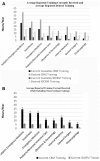Interdisciplinary Crisis Resource Management Training: How Do Otolaryngology Residents Compare? A Survey Study
- PMID: 30480212
- PMCID: PMC6239147
- DOI: 10.1177/2473974X18770409
Interdisciplinary Crisis Resource Management Training: How Do Otolaryngology Residents Compare? A Survey Study
Abstract
Objective: Emergent medical crises, such as acute airway obstruction, are often managed by interdisciplinary teams. However, resident training in crisis resource management traditionally occurs in silos. Our objective was to compare the current state of interdisciplinary crisis resource management (IDCRM) training of otolaryngology residents with other disciplines.
Methods: A survey study examining (1) the frequency with which residents are involved in interdisciplinary crises, (2) the current state of interdisciplinary training, and (3) the desired training was conducted targeting Canadian residents in the following disciplines: otolaryngology, anesthesiology, emergency medicine, general surgery, obstetrics and gynecology, internal medicine, pediatric emergency medicine, and pediatric/neonatal intensive care.
Results: A total of 474 surveys were completed (response rate, 12%). On average, residents were involved in 13 interdisciplinary crises per year. Only 8% of otolaryngology residents had access to IDCRM training, as opposed to 66% of anesthesiology residents. Otolaryngology residents reported receiving an average of 0.3 hours per year of interdisciplinary training, as compared with 5.4 hours per year for pediatric emergency medicine residents. Ninety-six percent of residents desired more IDCRM training, with 95% reporting a preference for simulation-based training.
Discussion: Residents reported participating in crises managed by interdisciplinary teams. There is strong interest in IDCRM and crisis resource management training; however, it is not uniformly available across Canadian residency programs. Despite their pivotal role in managing critical emergencies such as acute airway obstruction, otolaryngology residents received the least training.
Implication: IDCRM should be explicitly taught since it reflects reality and may positively affect patient outcomes.
Keywords: crisis resource management; interdisciplinary; medical education; multidisciplinary; patient safety/quality improvement; resident training.
Conflict of interest statement
Competing interests: None.
Figures



Similar articles
-
Emergency airway management: training and experience of chief residents in otolaryngology and anesthesiology.Head Neck. 2012 Dec;34(12):1720-6. doi: 10.1002/hed.21998. Epub 2012 Jan 27. Head Neck. 2012. PMID: 22287361 Free PMC article.
-
Advanced airway management teaching in otolaryngology residency programs in Canada: A survey of residents.Ear Nose Throat J. 2015 Apr-May;94(4-5):187-92. Ear Nose Throat J. 2015. PMID: 25923278
-
The training of pediatric residents in the care of acutely ill and injured children.Arch Pediatr Adolesc Med. 2000 Nov;154(11):1154-9. doi: 10.1001/archpedi.154.11.1154. Arch Pediatr Adolesc Med. 2000. PMID: 11074859
-
Using medical simulation to teach crisis resource management and decision-making skills to otolaryngology housestaff.Otolaryngol Head Neck Surg. 2011 Jul;145(1):35-42. doi: 10.1177/0194599811400833. Otolaryngol Head Neck Surg. 2011. PMID: 21493304
-
Obstetrics-gynecology resident long-acting reversible contraception training: the role of resident and program characteristics.Am J Obstet Gynecol. 2020 Apr;222(4S):S923.e1-S923.e8. doi: 10.1016/j.ajog.2019.12.007. Epub 2019 Dec 19. Am J Obstet Gynecol. 2020. PMID: 31866517
References
-
- Eppich WJ, Brannen M, Hunt EA. Team training: implications for emergency and critical care pediatrics. Curr Opin Pediatr. 2008;20:255-260. - PubMed
-
- Biron JF, Abrusci T, Hibbert P. Human factors in the management of the critically ill patient. Br J Anaesth. 2010;105:26-33. - PubMed
-
- Weinberg ER, Auerbach MA, Shah NB. The use of simulation for pediatric training and assessment. Curr Opin Pediatr. 2009;21:282-287. - PubMed
-
- Hayes CW, Rhee A, Detsky ME, Leblanc VR, Wax RS. Residents feel unprepared and unsupervised as leaders of cardiac arrest teams in teaching hospitals: a survey of internal medicine residents. Crit Care Med. 2007;35:1668-1672. - PubMed
-
- Frank JR. Medical leadership and effective interprofessional health care teams: a competency-based approach. RCPSC Public Policy website. http://rcpsc.medical.org/publicpolicy/documents/2007/10_frank.pdf. Published 2007. Assessed April 2016.
LinkOut - more resources
Full Text Sources

